Index relies entirely on the support of donors and readers to do its work.
Help us keep amplifying censored voices today.
A Chinese political cartoonist forced into exile and a Russian prisoners and LGBT rights activist convicted under the country’s draconian anti-protest law were among the winners of the 2017 Index on Censorship Freedom of Expression Awards.
The winners, announced on Wednesday evening at a gala ceremony in London, also included a crusading news organisation battling corruption in the Maldives and a group tracking Turkey’s internet shutdowns.
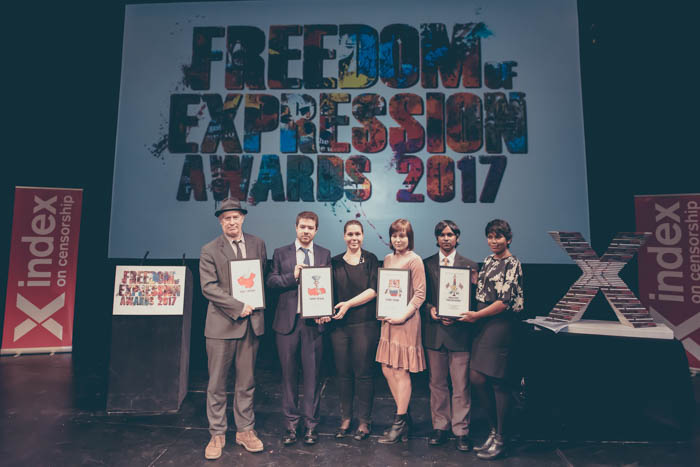
From left: Cartoonist Martin Rowson accepting the Arts Award on behalf of Chinese cartoonist Rebel Pepper; Alp Toker of Digital Activism Award-winner Turkey Blocks; Isik Mater of Digital Activism Award-winner Turkey Blocks; Anastasia Zotova, wife and campaign partner of Campaigning Award-winner Ildar Dadin; Ahemd Naish, editor of Journalism Award-winning Maldives Independent; Zaheena Rasheed, former editor of Journalism Award-winning Maldives Independent. (Photo: Elina Kansikas for Index on Censorship)
Awards were presented in four categories: arts, campaigning, digital activism and journalism.
The winners were: Chinese political cartoonist Rebel Pepper (Arts); Russian human rights activist Ildar Dadin (Campaigning); Digital collective Turkey Blocks (Digital Activism); news outlet Maldives Independent and its former editor Zaheena Rasheed (Journalism).
“These winners are free speech heroes who deserve global recognition,” said Index on Censorship CEO Jodie Ginsberg. “They, like all of those nominated, face huge personal and political hurdles in their fight so that others can express themselves freely.”
Drawn from more than 400 public nominations, the winners were presented with their awards at a ceremony at the Unicorn Theatre, London, hosted by comedian Katy Brand.
Actors, writers and musicians were among those celebrating with the winners. The guest list included activist Bianca Jagger, artist Bob and Roberta Smith, tech expert Nicole Yershon journalists Matthew Parris and David Aaronovitch, lawyer Nancy Hollander, novelist Hilary Mantel and director Peter Kosminsky.
Winners were presented with cartoons created by Aseem Trivedi, an Indian political cartoonist and activist, known for his Cartoons Against Corruption campaign.

High-res versions of the awards cartoons can be found here.
Neither Rebel Pepper nor Ildar Dadin could join the ceremony in London. Dadin was represented by his wife and campaigning partner Anastasia Zotova. Rebel Pepper delivered his acceptance speech via video.
Each of the award winners becomes part of the third cohort of Freedom of Expression Awards fellows. They join last year’s winners — Zaina Erhaim (Journalism), Bolo Bhi (Campaigning), GreatFire (Digital Activism), Murad Subay (Arts), Smockey (Music in Exile) — as part of a world-class network of campaigners, activists and artists sharing best practices on tackling censorship threats internationally.
Through the fellowship, Index works with the winners – both during an intensive week in London and the rest of the awarding year – to provide longer term, structured support. The goal is to help winners maximise their impact, broaden their support and ensure they can continue to excel at fighting free expression threats on the ground.
Judges included Harry Potter actor Noma Dumezweni, Hillsborough lawyer Caoilfhionn Gallagher QC, former Vanity Fair editor Tina Brown, as well as Anab Jain, TED fellow and co-founder of Superflux, and Stephen Budd, chairman of the Music Managers Forum.
Awards judge Tina Brown said: “At a time when freedom of expression and press are facing continuous and unprecedented threats around the globe, I am more than ever inspired by the boundless courage and sacrifices of Rebel Pepper, Ildar Dadin, Maldives Independent and Turkey Blocks. Ridiculed, persecuted, imprisoned, tortured, banned or exiled, these writers and activists are putting their lives on the line every day in order to protect basic human rights and fight injustice everywhere.”
Ziyad Marar, president of global publishing of SAGE Publishing, said: “Through working with Index for many years both as publisher of the magazine and sponsors of the awards ceremony, we at Sage are proud to support a truly outstanding organisation as they defend free expression around the world. Our warmest congratulations to everyone recognised tonight for their achievements and the inspiring example they set for us all.”
This is the 17th year of the Freedom of Expression Awards. Former winners include activist Malala Yousafzai, cartoonist Ali Ferzat, journalists Anna Politkovskaya and Fergal Keane, and Bahrain Center for Human Rights.
Guests were treated to food provided by Ganapati Restaurant and beer created by craft brewery Flying Dog.
Further details about the award winners are below.
For interviews with the award winners, who are in London until Friday 21 April, please contact David Heinemann at [email protected].
Videos, photographs and other content related to the awards night will be available beginning 11am on Thursday 20 April. Please contact Sean Gallagher at [email protected].
Index on Censorship is grateful for the support of the 2017 Freedom of Expression Awards sponsors: SAGE Publishing, Google, Private Internet Access, CNN, Vodafone, Vice News, Doughty Street Chambers, former Index Award-winning Psiphon, Gorkana, Edwardian Hotels and Flying Dog Brewery. Additional consideration provided by PROPERCORN and Divine Chocolate.
—–
Index on Censorship Freedom of Expression Awards 2017 – background on winners
Arts – Rebel Pepper (China)
Cartoonist Wang Liming (aka Rebel Pepper) was presented with the Index 2017 Freedom of Expression Award Arts award for satirising Chinese Premier Xi Jinping and lampooning the ruling Communist Party. For his efforts Rebel Pepper has been repeatedly persecuted. In 2014, he took exile in Japan after serious threats against him were posted on Chinese government-sanctioned online forums. The Chinese state has since disconnected him from his fan base by repeatedly deleting his social media accounts, conversations with friends and family are under state surveillance, and exile has made him isolated, bringing significant financial struggles. Nonetheless, Rebel Pepper keeps drawing, ferociously criticising the Chinese regime.
Journalist and 2017 Freedom of Expression Award judge Tina Brown said: “Rebel Pepper was cut off from his family, cut off from all his friends and he wasn’t even able to go back for his mother’s funeral after she died from cancer, which is a very, very cruel fate for someone who simply wanted to tell the truth. At a time when the president of China is going off to Davos and making big statesmen-like speeches about how China is a big open society now, everybody come and trade, the fact is that it’s a really repressive and dark regime.”
In his acceptance speech, delivered by video, Wang Liming said: “Political cartoons are significant as I can use my works to peel away the mask of false perfection put on by the Chinese government. The humour and satire employed in my works can also help lighten the mood and dispel the fear that the Chinese people have towards the administration. I feel that these are the key reasons why political cartoons play such an important role in China. Ever since I came to Japan, I have been able to relish freedom of speech to the fullest. As such, my works are no longer limited by any external restrictions save for the boundaries of my own imagination.”
Campaigning – Ildar Dadin (Russia). Award supported by Doughty Street Chambers
A Russian prisoners and LGBT rights activist, Dadin was the first, and only, person to be convicted under a notorious 2014 public assembly law. Aimed at punishing anyone who breaks strict rules on protest, the law was enacted to silence dissent after a wave of demonstrations following President Vladimir Putin’s last election victory. Dadin’s crime was to stage a series of one-man pickets, often standing silently with a billboard, attempting to duck the cynical law and push for free expression. For his solo enterprise, Dadin was arrested and sentenced to three years imprisonment in December 2015. In November 2016, website Meduza published a letter smuggled from Dadin to his wife, exposing torture he suffered alongside fellow prisoners. In February 2017, a Russian court quashed his conviction and Dadin was released.
Barrister and 2017 Freedom of Expression Awards judge Caoilfhionn Gallagher QC said: “Ildar Dadin has stood up to the Russian authorities in circumstances where we know how risky that can be: It has cost individuals their lives in recent years. It can even lose you a presidential election, as we now know. But Ildar, despite that, has continued to speak out and he continues to speak out even in the worst of circumstances.”
Speaking on behalf of Ildar Dadin, his wife and campaigning partner Anastasia Zotova said: “Tonight I tell you, that in Russia, there are no human rights. It is a society ruled through levels of cruelty and bigotry where Russians are forced to worship the great leader and any and all dissidents are stoned. Maybe I cannot join you in London but I can refuse to be silent. And you, friends, can refuse to be silent too. You can refuse to let these people silence me. Together, we can refuse to look away.”
Digital Campaigning – Turkey Blocks (Turkey). Award sponsored by Private Internet Access
Turkey Blocks is a digital transparency project documenting internet blackouts in a country marked by increasing authoritarianism, a strident crackdown on press and social media and numerous human rights violations.Turkish-British technologist Alp Toker brought together a small team to investigate internet restrictions and using Raspberry Pi technology they built an open source tool able to reliably monitor and report both internet shut downs and power blackouts in real time. Using their tool, Turkey Blocks have since broken news of 14 mass-censorship incidents during several politically significant events in 2016. The tool has proved so successful that it has been implemented elsewhere globally.
Designer and 2017 Freedom of Expression Awards judge Anab Jain said: “Alp Toker and Turkey Block’s work is important because it is going to have impact not just in Turkey but across the world wherever we start to see internet shutdowns.”
Alp Toker, founder of Turkey Blocks, said: “Turkey Blocks has developed new technology that can pinpoint and validate reports of shutdowns in real time. Through 2016 we uncovered evidence of over a dozen major blackouts during national emergencies, arrests of opposition party members and a devastating attempted military coup. We provided the data that enabled media, local press and international communities to report with confidence and push back to keep the internet on. We encouraged the government to become more transparent and limit use of their telecommunications kill-switch. Today our cause crosses political lines and resounds throughout Turkey’s polarised society.”
Journalism – Maldives Independent and Zaheena Rasheed (Maldives). Award sponsored by CNN
Website Maldives Independent, which provides news in English, is one of the few remaining independent media outlets in a country that ranks 112 out of 180 countries on the Reporters Without Borders Press Freedom Index. In August 2016 the Maldives passed a law criminalising defamation and empowering the state to impose heavy fines and shut down media outlets for “defamatory” content. In September, Maldives Independent’s office was violently attacked and later raided by the police, after the release of an Al Jazeera documentary exposing government corruption that contained interviews with former editor Zaheena Rasheed, who had to flee for her safety. Despite the pressure, the outlet continues to hold the government to account.
Doughty Street Chambers Barrister and 2017 Freedom of Expression Awards judge Caoilfhionn Gallagher QC said: “Maldives Independent under the stewardship of Zaheena Rasheed has faced attacks from all sides in recent years and despite all that they’ve continued to do what they do best: tell stories, expose corruption, expose human rights abuses and attacks on a free press.”
Zaheena Rasheed, former editor, Maldives Independent said: “This award feels like a lifeline. Most of our challenges remain the same, but this recognition and the fellowship has renewed and strengthened our resolve to continue reporting, especially on the bleakest of days. Most importantly, we no longer feel so alone. Tonight I want to honour my colleague, Ahmed Rilwan – who embodies the spirit of speaking truth to power, even in the face of the gravest threats. He’s been missing for nearly 1,000 days now. I want to say tonight, that no matter how long it may take, we will continue the search for him and fight for him.”
ABOUT THE FREEDOM OF EXPRESSION AWARDS AND FELLOWSHIP
The Index on Censorship Freedom of Expression Awards recognise those individuals and groups making the greatest impact in tackling censorship worldwide. Established 17 years ago, the awards shine a light on work being undertaken in defence of free expression globally. Often these stories go unnoticed or are ignored by the mainstream press. Through the fellowship, Index works with the winners – both during an intensive week in London and the rest of the awarding year – to provide longer term, structured support. The goal is to help winners maximise their impact, broaden their support and ensure they can continue to excel at fighting free expression threats on the ground.
ABOUT INDEX ON CENSORSHIP
Index on Censorship is a UK-based nonprofit that campaigns against censorship and promotes free expression worldwide. Founded in 1972, Index has published some of the world’s leading writers and artists in its award-winning quarterly magazine, including Nadine Gordimer, Mario Vargas Llosa, Samuel Beckett and Kurt Vonnegut. Index promotes debate, monitors threats to free speech and supports individuals through its annual awards and fellowship program.
[vc_row full_width=”stretch_row_content_no_spaces”][vc_column][vc_column_text]
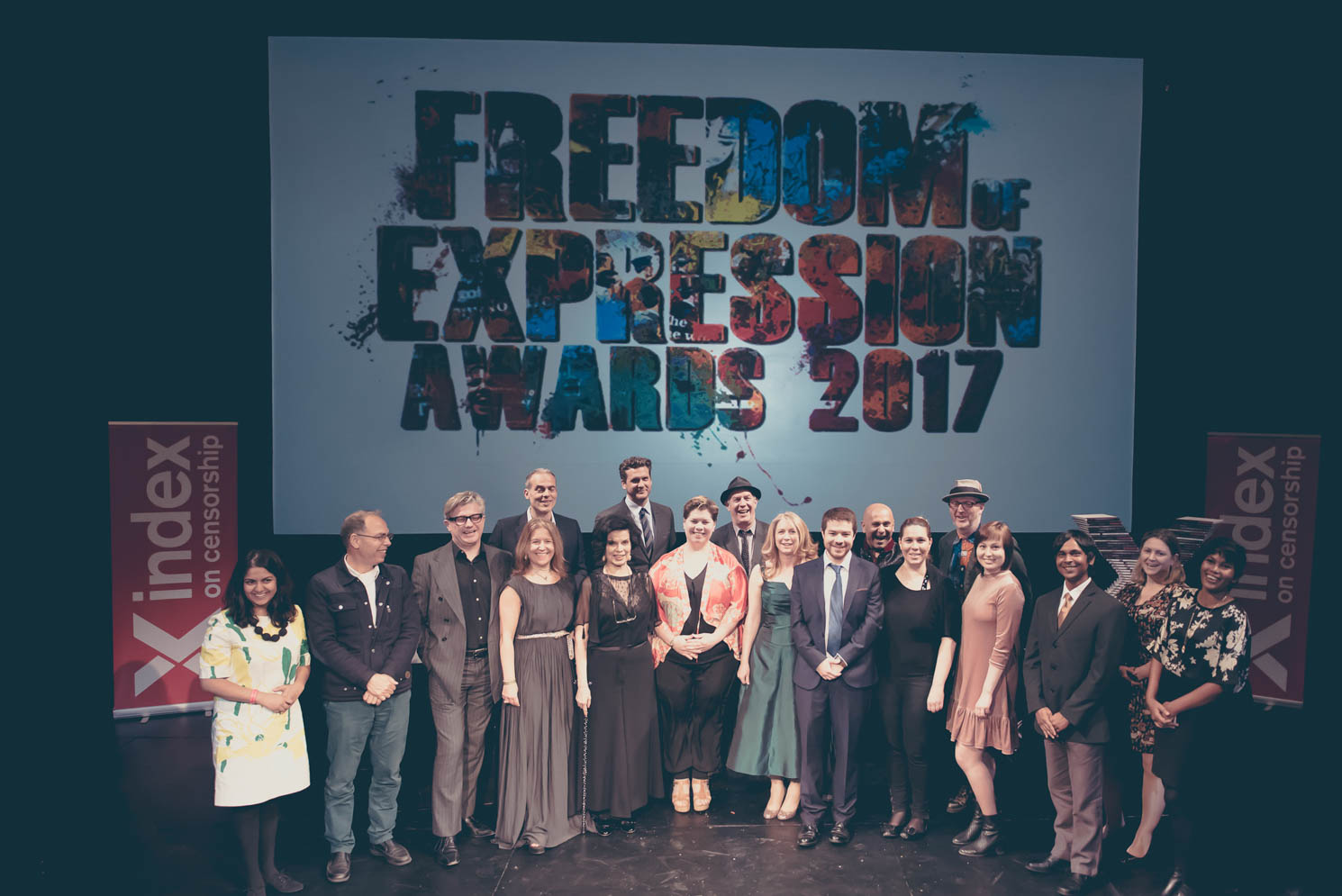
From left: Co-founder Superflux and Freedom of Expression Awards Judge Anab Jain, finalist Maati Monjib, music executive and Freedom of Expression Awards Judge Stephen Budd, tech expert Nicole Yershon, global publishing director Ziyad Marar, president and founder of the Bianca Jagger Human Rights Foundation Bianca Jagger, CNN London Bureau chief Tommy Evans, comedian and actor Katy Brand, cartoonist Martin Rowson, Index CEO Jodie Ginsberg, Turkey Blocks’ Alp Toker, Poet Shane Solanki, Turkey Blocks’ Isik Mater, artist Bob and Roberta Smith, wife and campaigning partner of Ildar Dadin Anastasia Zotova, Maldives Independent’s Ahmed Naish, Freedom of Expression Awards Judge and Barrister Caoilfhionn Gallagher QC, Maldives Independent’s Zaheena Rasheed (Photo: Elina Kansikas for Index on Censorship) High resolution images are available for download on Flickr
A Chinese political cartoonist forced into exile and a Russian prisoners and LGBT rights activist convicted under the country’s draconian anti-protest law were among the winners of the 2017 Index on Censorship Freedom of Expression Awards.
The winners, announced on Wednesday evening at a gala ceremony in London, also included a crusading news organisation battling corruption in the Maldives and a group tracking Turkey’s internet shutdowns.
Awards were presented in four categories: Arts, Campaigning, Digital Activism and Journalism.
The winners were: Chinese political cartoonist Rebel Pepper (Arts); Russian human rights activist Ildar Dadin (Campaigning); Digital collective Turkey Blocks (Digital Activism); news outlet Maldives Independent and its former editor Zaheena Rasheed (Journalism).
“These winners are free speech heroes who deserve global recognition,” said Index on Censorship CEO Jodie Ginsberg. “They, like all of those nominated, face huge personal and political hurdles in their fight so that others can express themselves freely.”
Drawn more than 400 public nominations, the winners were presented with their awards at a ceremony at the Unicorn Theatre, London, hosted by comedian Katy Brand.
Winners were presented with cartoons created by Aseem Trivedi, an Indian political cartoonist and activist, known for his Cartoons Against Corruption campaign.

Each of the award winners becomes part of the third cohort of Freedom of Expression Awards fellows. They join last year’s winners — Zaina Erhaim (Journalism), Bolo Bhi (Campaigning), GreatFire (Digital Activism), Murad Subay (Arts), Smockey (Music in Exile) — as part of a world-class network of campaigners, activists and artists sharing best practices on tackling censorship threats internationally.
Through the fellowship, Index works with the winners – both during an intensive week in London and the rest of the awarding year – to provide longer term, structured support. The goal is to help winners maximise their impact, broaden their support and ensure they can continue to excel at fighting free expression threats on the ground.
Judges included Harry Potter actor Noma Dumezweni, Hillsborough lawyer Caoilfhionn Gallagher QC, former Vanity Fair editor Tina Brown, as well as Anab Jain, TED fellow and co-founder of Superflux, and Stephen Budd, chairman of the Music Managers Forum.
Awards judge Tina Brown said: “At a time when freedom of expression and press are facing continuous and unprecedented threats around the globe, I am more than ever inspired by the boundless courage and sacrifices of Rebel Pepper, Ildar Dadin, Maldives Independent and Turkey Blocks. Ridiculed, persecuted, imprisoned, tortured, banned or exiled, these writers and activists are putting their lives on the line every day in order to protect basic human rights and fight injustice everywhere.”
This is the 17th year of the Freedom of Expression Awards. Former winners include activist Malala Yousafzai, cartoonist Ali Ferzat, journalists Anna Politkovskaya and Fergal Keane, and Bahrain Center for Human Rights.[/vc_column_text][/vc_column][/vc_row][vc_row full_width=”stretch_row_content_no_spaces” content_placement=”middle”][vc_column][vc_column_text]
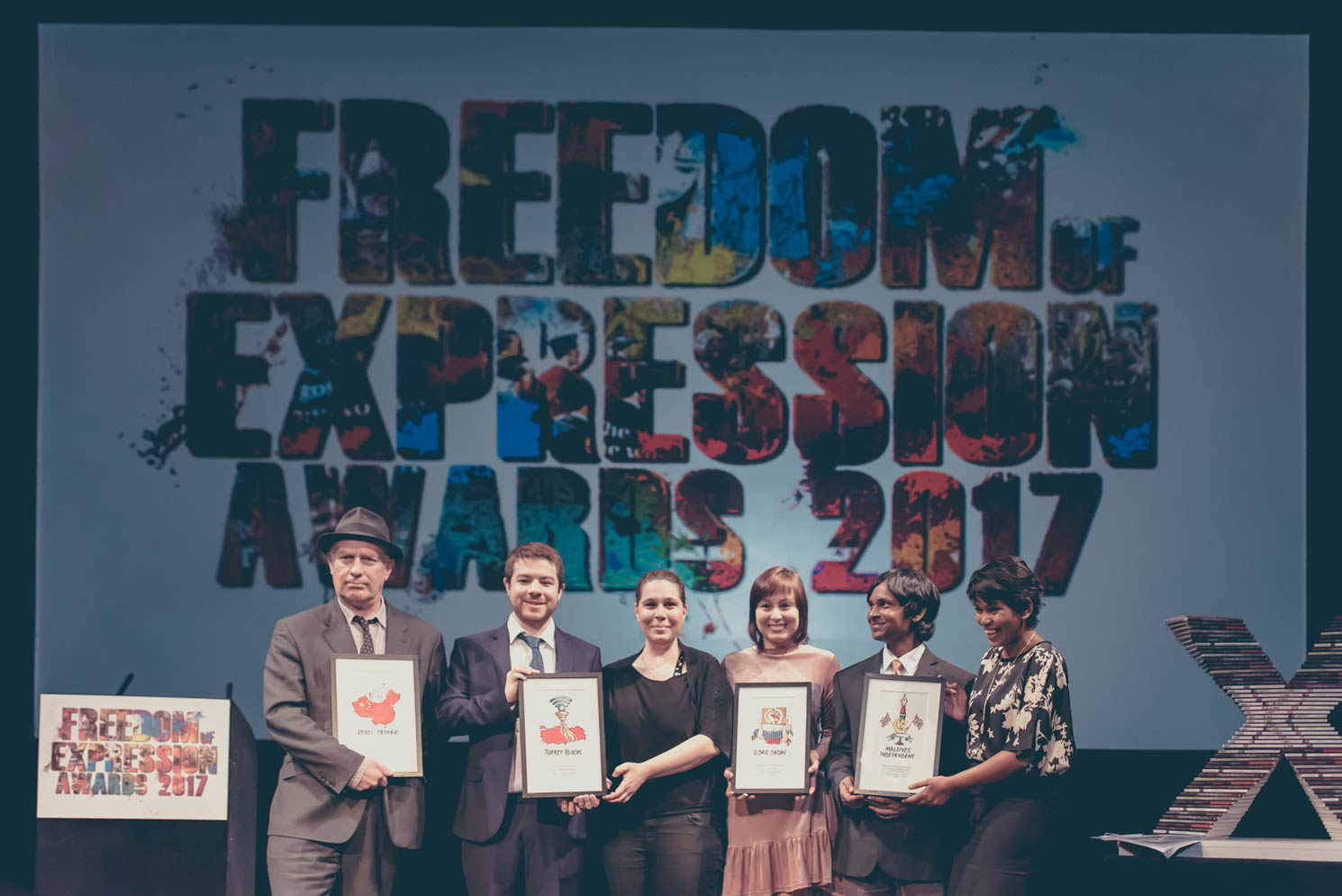
From left: Cartoonist Martin Rowson accepting the Arts Award on behalf of Chinese cartoonist Rebel Pepper; Alp Toker of Digital Activism Award-winner Turkey Blocks; Isik Mater of Digital Activism Award-winner Turkey Blocks; Anastasia Zotova, wife and campaign partner of Campaigning Award-winner Ildar Dadin; Ahemd Naish, editor of Journalism Award-winning Maldives Independent; Zaheena Rasheed, former editor of Journalism Award-winning Maldives Independent. (Photo: Elina Kansikas for Index on Censorship) High resolution images are available for download on Flickr
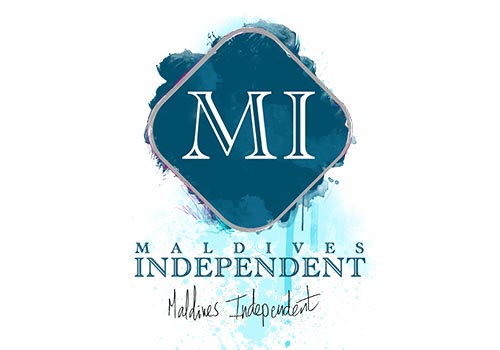 Maldives Independent and Zaheena Rasheed have been named the winner of the 2017 Freedom of Expression Journalism Award.
Maldives Independent and Zaheena Rasheed have been named the winner of the 2017 Freedom of Expression Journalism Award.
Website Maldives Independent, which provides news in English, is one of the few remaining independent media outlets in a country that ranks 112 out of 180 countries on the Reporters Without Borders Press Freedom Index. In August 2016 the Maldives passed a law criminalising defamation and empowering the state to impose heavy fines and shut down media outlets for “defamatory” content. In September, Maldives Independent’s office was violently attacked and later raided by the police, after the release of an Al Jazeera documentary exposing government corruption that contained interviews with editor Zaheena Rasheed, who had to flee for her safety. Despite the pressure, the outlet continues to hold the government to account.
Doughty Street Chambers Barrister and 2017 Freedom of Expression Awards judge Caoilfhionn Gallagher QC said: “Maldives Indpendent under the stewardship of Zaheena Rasheed has faced attacks from all sides in recent years and despite all that they’ve continued to do what they do best: tell stories, expose corruption, expose human rights abuses and attacks on a free press.”
Zaheena Rasheed, former editor, Maldives Independent said: “This award feels like a lifeline. Most of our challenges remain the same, but this recognition and the fellowship has renewed and strengthened our resolve to continue reporting, especially on the bleakest of days. Most importantly, we no longer feel so alone. Tonight I want to honour my colleague, Ahmed Rilwan – who embodies the spirit of speaking truth to power, even in the face of the gravest threats. He’s been missing for nearly 1,000 days now. I want to say tonight, that no matter how long it may take, we will continue the search for him and fight for him.”
Speech | Profile[/vc_column_text][/vc_column][/vc_row][vc_row][vc_column][vc_text_separator title=”2017 Freedom of Expression Digital Activism Award”][vc_column_text]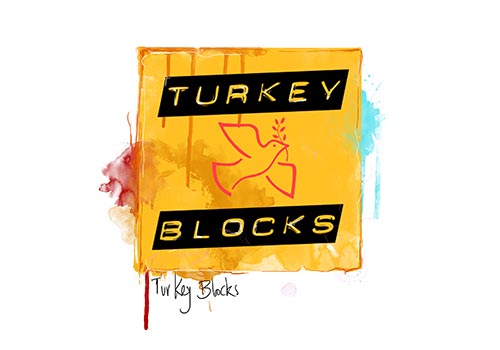
Turkey Blocks is a digital transparency project documenting internet blackouts in a country marked by increasing authoritarianism, a strident crackdown on press and social media and numerous human rights violations.Turkish-British technologist Alp Toker brought together a small team to investigate internet restrictions and using Raspberry Pi technology they built an open source tool able to reliably monitor and report both internet shut downs and power blackouts in real time. Using their tool, Turkey Blocks have since broken news of 14 mass-censorship incidents during several politically significant events in 2016. The tool has proved so successful that it has been implemented elsewhere globally.
Designer and 2017 Freedom of Expression Awards judge Anab Jain said: “Alp Toker and Turkey Block’s work is important because it is going to have impact not just in Turkey but across the world wherever we start to see internet shutdowns.”
Alp Toker, founder of Turkey Blocks, said: “Turkey Blocks has developed new technology that can pinpoint and validate reports of shutdowns in real time. Through 2016 we uncovered evidence of over a dozen major blackouts during national emergencies, arrests of opposition party members and a devastating attempted military coup. We provided the data that enabled media, local press and international communities to report with confidence and push back to keep the internet on. We encouraged the government to become more transparent and limit use of their telecommunications kill-switch. Today our cause crosses political lines and resounds throughout Turkey’s polarised society.”
Speech | Profile[/vc_column_text][/vc_column][/vc_row][vc_row][vc_column][vc_text_separator title=”2017 Freedom of Expression Campaigning Award”][vc_column_text]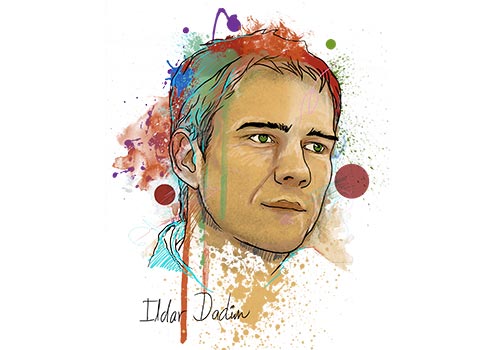
A Russian prisoners and LGBT rights activist, Dadin was the first, and only, person to be convicted under a notorious 2014 public assembly law. Aimed at punishing anyone who breaks strict rules on protest, the law was enacted to silence dissent after a wave of demonstrations following President Vladimir Putin’s last election victory. Dadin’s crime was to stage a series of one-man pickets, often standing silently with a billboard, attempting to duck the cynical law and push for free expression. For his solo enterprise, Dadin was arrested and sentenced to three years imprisonment in December 2015. In November 2016, website Meduza published a letter smuggled from Dadin to his wife, exposing torture he suffered alongside fellow prisoners. In February 2017, a Russian court quashed his conviction and Dadin was released.
Barrister and 2017 Freedom of Expression Awards judge Caoilfhionn Gallagher QC said: “Ildar Dadin has stood up to the Russian authorities in circumstances where we know how risky that can be: It has cost individuals their lives in recent years. It can even lose you a presidential election, as we now know. But Ildar, despite that, has continued to speak out and he continues to speak out even in the worst of circumstances.”
Speaking on behalf of Ildar Dadin, his wife and campaigning partner Anastasia Zotova said: “Tonight I tell you, that in Russia, there are no human rights. It is a society ruled through levels of cruelty and bigotry where Russians are forced to worship the great leader and any and all dissidents are stoned. Maybe I cannot join you in London but I can refuse to be silent. And you, friends, can refuse to be silent too. You can refuse to let these people silence me. Together, we can refuse to look away.”
Speech | Profile[/vc_column_text][/vc_column][/vc_row][vc_row][vc_column][vc_text_separator title=”2017 Freedom of Expression Arts Award”][vc_column_text]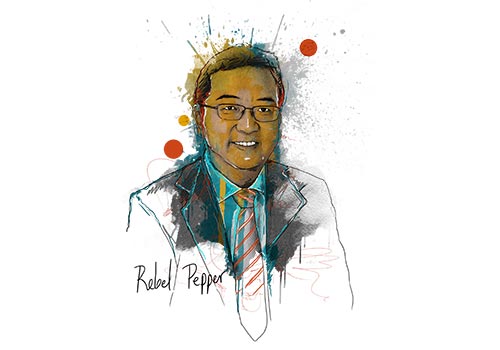
Cartoonist Wang Liming (aka Rebel Pepper) was presented with the Index 2017 Freedom of Expression Award Arts award for satirising Chinese Premier Xi Jinping and lampooning the ruling Communist Party. For his efforts Rebel Pepper has been repeatedly persecuted. In 2014, he took exile in Japan after serious threats against him were posted on Chinese government-sanctioned online forums. The Chinese state has since disconnected him from his fan base by repeatedly deleting his social media accounts, conversations with friends and family are under state surveillance, and exile has made him isolated, bringing significant financial struggles. Nonetheless, Rebel Pepper keeps drawing, ferociously criticising the Chinese regime.
Journalist and 2017 Freedom of Expression Award judge Tina Brown said: “Rebel Pepper was cut off from his family, cut off from all his friends and he wasn’t even able to go back for his mother’s funeral after she died from cancer, which is a very, very cruel fate for someone who simply wanted to tell the truth. At a time when the president of China is going off to Davos and making big statesmen-like speeches about how China is a big open society now, everybody come and trade, the fact is that it’s a really repressive and dark regime.”
In his acceptance speech, delivered by video, Wang Liming said: “Political cartoons are significant as I can use my works to peel away the mask of false perfection put on by the Chinese government. The humour and satire employed in my works can also help lighten the mood and dispel the fear that the Chinese people have towards the administration. I feel that these are the key reasons why political cartoons play such an important role in China. Ever since I came to Japan, I have been able to relish freedom of speech to the fullest. As such, my works are no longer limited by any external restrictions save for the boundaries of my own imagination.”
Speech | Profile[/vc_column_text][/vc_column][/vc_row][vc_row][vc_column][vc_text_separator title=”Jodie Ginsberg: Our ambition is modest: nothing less than an end to censorship”][vc_column_text]
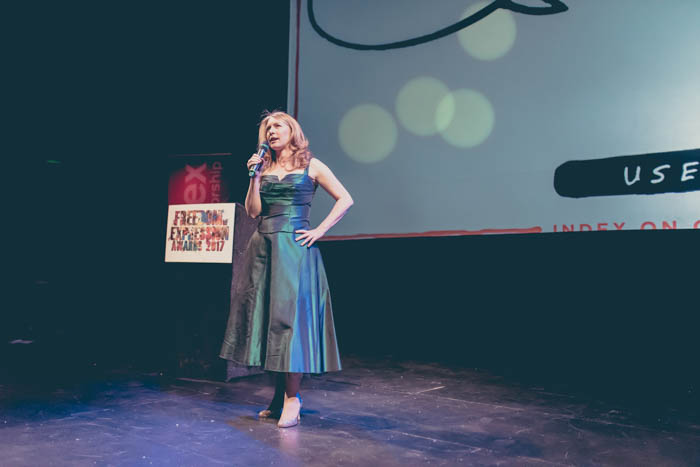
Jodie Ginsberg, chief executive, Index on Censorship (Photo: Elina Kansikas for Index on Censorship)
“I hope you are indeed having an extraordinary evening. It’s extraordinary because of the individuals and groups we have honoured here tonight and it’s extraordinary because you make it so.
“Many of you are old friends of Index. Others are new acquaintances. For those of us who are new to us – and the old friends who may have forgotten – I want to take this opportunity to tell, or remind, you a little bit about us and what we do.
“Index was founded 45 years ago to tell the stories of dissidents behind the Iron Curtain and beyond – from the very first magazine we featured stories from across the world by and about censored writers and artists: from Brazil to Greece to Bangladesh. We were concerned then, as now, not just with the written word but all forms of expression. And we have continued to publish this magazine – the only of its kind in the world – ever since.”
[/vc_column_text][vc_column_text]High-resolution images are available for download on Flickr.[/vc_column_text][/vc_column][/vc_row][vc_row][vc_column][vc_media_grid grid_id=”vc_gid:1494001232704-44285c22-af33-2″ include=”89695,89694,89693,89692,89691,89690,89689,89688,89687,89686,89685,89684,89683,89682,89681,89680,89679,89678,89677,89676,89675,89673,89672,89671,89669,89667,89666,89665,89663,89662,89582,89581,89580,89578,89577,89576,89575,89574,89552,89551,89550,89549,89548,89547,89546,89545,89544,89543,89542,89540,89539,89538,89537,89536,89535,89534,89533,89532,89531,89530,89529,89528,89527,89523,89522,89520,89519,89518,89517,89515,89514,89513,89512,89511,89510,89509,89508,89491,89490,89489,89488,89487,89484,89706″][vc_basic_grid post_type=”post” max_items=”12″ style=”load-more” items_per_page=”4″ element_width=”6″ grid_id=”vc_gid:1494001233011-308855d4-4b96-8″ taxonomies=”8935, 8734″][/vc_column][/vc_row]
[vc_row][vc_column][vc_custom_heading text=”This is the first of a series of articles from the Index on Censorship magazine archives exploring the erosion of media freedom around the world.
Writing in the summer 2016 issue of the magazine, Syrian citizen journalist HAZZA AL-ADNAN explored the realities of reporting in a country where a pseudonym and bulletproof vest offer little protection from constant danger” google_fonts=”font_family:Libre%20Baskerville%3Aregular%2Citalic%2C700|font_style:400%20italic%3A400%3Aitalic”][/vc_column][/vc_row][vc_row][vc_column][vc_column_text]
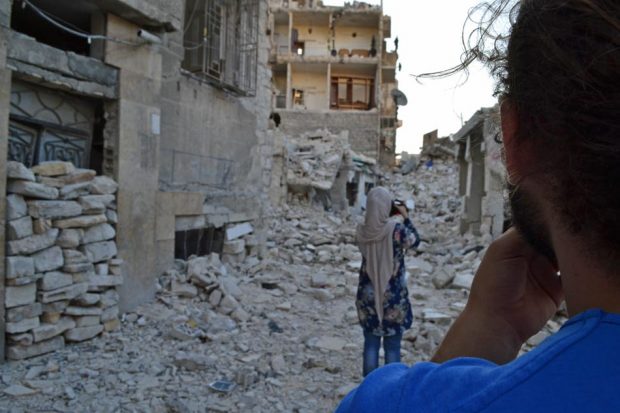
Aleppo: Somehow destroyed buildings and massacres become part of the daily view and even marks to guide people to places. (Photo: Zaina Erhaim)
[/vc_column_text][/vc_column][/vc_row][vc_row equal_height=”yes” content_placement=”middle” el_class=”text_white” css=”.vc_custom_1488903767246{background-color: #dd1f1f !important;}”][vc_column width=”1/2″][vc_custom_heading text=”Protect Media Freedom” font_container=”tag:p|font_size:28|text_align:left” use_theme_fonts=”yes” css_animation=”fadeIn” link=”url:https%3A%2F%2Fwww.indexoncensorship.org%2Fdefend-media-freedom-donate-index%2F|||”][vc_column_text]
We monitor threats to press freedom, produce an award-winning magazine and publish work by censored writers.[/vc_column_text][/vc_column][vc_column width=”1/2″ css=”.vc_custom_1488903306764{background-image: url(https://www.indexoncensorship.org/wp-content/uploads/2013/08/newspapers.jpg?id=50885) !important;background-position: center !important;background-repeat: no-repeat !important;background-size: cover !important;}”][/vc_column][/vc_row][vc_row][vc_column][vc_column_text]
[/vc_column_text][/vc_column][/vc_row][vc_row][vc_column][vc_column_text]
[/vc_column_text][vc_column_text]This article appeared in the summer 2016 issue of Index on Censorship magazine. [/vc_column_text][/vc_column][/vc_row][vc_row content_placement=”top”][vc_column width=”1/3″][vc_custom_heading text=”Danger in truth: truth in danger” font_container=”tag:p|font_size:24|text_align:left” link=”url:https%3A%2F%2Fwww.indexoncensorship.org%2F2016%2F05%2Fdanger-in-truth-truth-in-danger%2F|||”][vc_column_text]The summer 2016 issue of Index on Censorship magazine looks at why journalists around the world face increasing threats.
In the issue: articles by journalists Lindsey Hilsum and Jean-Paul Marthoz plus Stephen Grey. Special report on dangerous journalism, China’s most famous political cartoonist and the late Henning Mankell on colonialism in Africa.[/vc_column_text][/vc_column][vc_column width=”1/3″][vc_single_image image=”76282″ img_size=”medium” alignment=”center” onclick=”custom_link” link=”https://www.indexoncensorship.org/2016/12/fashion-rules/”][/vc_column][vc_column width=”1/3″ css=”.vc_custom_1481888488328{padding-bottom: 50px !important;}”][vc_custom_heading text=”Subscribe” font_container=”tag:p|font_size:24|text_align:left” link=”url:https%3A%2F%2Fwww.indexoncensorship.org%2Fsubscribe%2F|||”][vc_column_text]In print, online. In your mailbox, on your iPad.
Subscription options from £18.
Every subscriber helps support Index on Censorship’s projects around the world.
![]() SUBSCRIBE NOW[/vc_column_text][/vc_column][/vc_row][vc_row][vc_column][three_column_post title=”Media Freedom” category_id=”9044″][/vc_column][/vc_row]
SUBSCRIBE NOW[/vc_column_text][/vc_column][/vc_row][vc_row][vc_column][three_column_post title=”Media Freedom” category_id=”9044″][/vc_column][/vc_row]
[vc_row full_width=”stretch_row_content_no_spaces” full_height=”yes” css_animation=”fadeIn” css=”.vc_custom_1488381975897{background-image: url(https://www.indexoncensorship.org/wp-content/uploads/2016/10/zaina-erhaim-1460×490.jpg?id=80519) !important;background-position: center !important;background-repeat: no-repeat !important;background-size: cover !important;}” el_class=”text_white”][vc_column width=”1/2″][/vc_column][vc_column width=”1/2″][vc_custom_heading text=”Zaina Erhaim, 2016 Freedom of Expression Awards Journalism Fellow” font_container=”tag:p|font_size:32|text_align:left” use_theme_fonts=”yes”][vc_custom_heading text=”Her government wanted her dead for training Syrian women and men to report on untold stories as their cities became engulfed in destruction. They reported her passport stolen to lock her in exile.” font_container=”tag:p|font_size:26|text_align:left” use_theme_fonts=”yes”][/vc_column][/vc_row][vc_row equal_height=”yes” css=”.vc_custom_1488381650351{margin-right: -15px !important;margin-left: -15px !important;padding-top: 0px !important;}”][vc_column css=”.vc_custom_1488381225666{margin-right: 15px !important;margin-bottom: 15px !important;margin-left: 15px !important;}”][vc_column_text]Index on Censorship Freedom of Expression Award-winning Zaina Erhaim was studying journalism in London when civil war erupted in Syria in 2013. Erhaim felt compelled to report from her homeland and teach her craft to citizen journalists. For her efforts she was targeted by the government and its foes.
But she continues her work to highlight the unreported stories in the battle for Syria’s future.
Index on Censorship is committed to exposing censorship and threats to freedom of expression in countries like Syria.
We are a nonprofit that campaigns for and defends free expression worldwide. We publish work by censored writers and artists, promote debate, and monitor threats to free speech – and we support individuals like Zaina through our annual awards and fellowship programme.
We believe that everyone should be free to express themselves without fear of harm or persecution – no matter what their views.
Make sure your voice, and theirs, can be heard.[/vc_column_text][/vc_column][/vc_row][vc_row css=”.vc_custom_1488382458138{margin-top: -25px !important;}”][vc_column][vc_single_image image=”85924″ img_size=”full” alignment=”center”][/vc_column][/vc_row][vc_row][vc_column][vc_custom_heading text=”Join the Index mailing list and get an exclusive gift” font_container=”tag:h3|text_align:left” use_theme_fonts=”yes”][vc_separator color=”black”][/vc_column][/vc_row][vc_row content_placement=”top”][vc_column width=”1/2″][vc_row_inner][vc_column_inner width=”1/2″][vc_column_text]We’ll send you our weekly emails and periodic updates on our events. We won’t share your personal information with anyone outside Index.
You’ll also get access to an exclusive collection of articles from our landmark 250th issue of Index on Censorship magazine exploring journalists under fire and under pressure. Your downloadable PDF will include reports from Lindsey Hilsum, Laura Silvia Battaglia and Hazza Al-Adnan.[/vc_column_text][/vc_column_inner][vc_column_inner width=”1/2″][vc_single_image image=”76282″ img_size=”full” alignment=”center”][/vc_column_inner][/vc_row_inner][/vc_column][vc_column width=”1/2″][gravityform id=”20″ title=”false” description=”false” ajax=”false”][/vc_column][/vc_row][vc_row][vc_column][vc_custom_heading text=”Mapping Media Freedom” font_container=”tag:h3|text_align:left” use_theme_fonts=”yes” link=”url:https%3A%2F%2Fmappingmediafreedom.org%2F%23%2F|||”][vc_separator color=”black”][/vc_column][/vc_row][vc_row equal_height=”yes” content_placement=”middle”][vc_column width=”1/2″][vc_column_text]
Launched in May 2014, the database contains over 2,700 verified threats to media freedom. We monitor incidents in 42 European and neighbouring countries. We lobby governments and the EU to take action to protect journalists and citizens’s rights to information.[/vc_column_text][/vc_column][vc_column width=”1/2″ css=”.vc_custom_1488811147533{background-image: url(https://www.indexoncensorship.org/wp-content/uploads/2017/01/MMF_report_2016_WEB-1-1A.jpg?id=85872) !important;background-position: center !important;background-repeat: no-repeat !important;background-size: cover !important;}”][/vc_column][/vc_row][vc_row][vc_column][vc_custom_heading text=”Freedom of Expression Awards Fellowship” font_container=”tag:h3|text_align:left” use_theme_fonts=”yes” link=”url:https%3A%2F%2Fwww.indexoncensorship.org%2Ffellowship%2F|||”][vc_separator color=”black”][/vc_column][/vc_row][vc_row equal_height=”yes” content_placement=”middle” css=”.vc_custom_1488975007999{margin-bottom: 100px !important;}”][vc_column width=”1/2″][vc_column_text]Through the Index Awards Fellowship we work with our winners – both during an intensive week in London and the rest of the awarding year – to provide longer term, structured support.
The goal is to help winners maximise their impact, broaden their support and ensure they can continue to excel at fighting free expression threats on the ground.[/vc_column_text][/vc_column][vc_column width=”1/2″ css=”.vc_custom_1488974966097{background-image: url(https://www.indexoncensorship.org/wp-content/uploads/2016/11/donate-heads-slider-490w.jpg?id=85882) !important;background-position: center !important;background-repeat: no-repeat !important;background-size: cover !important;}”][/vc_column][/vc_row]